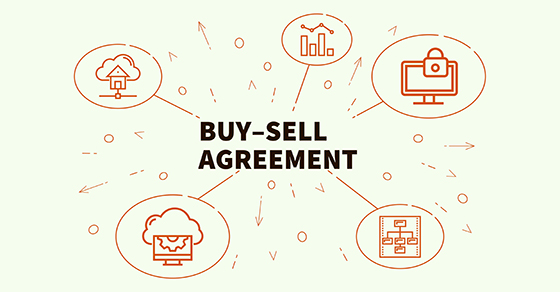Are you buying a business that will have one or more co-owners? Or do you already own one fitting that description? If so, consider installing a buy-sell agreement. A well-drafted agreement can do these valuable things:
- Transform your business ownership interest into a more liquid asset,
- Prevent unwanted ownership changes, and
- Avoid hassles with the IRS.
Agreement basics
There are two basic types of buy-sell agreements: Cross-purchase agreements and redemption agreements (sometimes called liquidation agreements).
A cross-purchase agreement is a contract between you and the other co-owners. Under the agreement, a withdrawing co-owner’s ownership interest must be purchased by the remaining co-owners if a triggering event, such as a death or disability, occurs.
A redemption agreement is a contract between the business entity and its co-owners (including you). Under the agreement, a withdrawing co-owner’s ownership interest must be purchased by the entity if a triggering event occurs.
Triggering events
You and the other co-owners specify the triggering events you want to include in your agreement. You’ll certainly want to include obvious events like death, disability and attainment of a stated retirement age. You can also include other events that you deem appropriate, such as divorce.
Valuation and payment terms
Make sure your buy-sell agreement stipulates an acceptable method for valuing the business ownership interests. Common valuation methods include using a fixed per-share price, an appraised fair market value figure, or a formula that sets the selling price as a multiple of earnings or cash flow.
Also ensure the agreement specifies how amounts will be paid out to withdrawing co-owners or their heirs under various triggering events.
Life insurance to fund the agreement
The death of a co-owner is perhaps the most common, and catastrophic, triggering event. You can use life insurance policies to form the financial backbone of your buy-sell agreement.
In the simplest case of a cross-purchase agreement between two co-owners, each co-owner purchases a life insurance policy on the other. If one co-owner dies, the surviving co-owner collects the insurance death benefit proceeds and uses them to buy out the deceased co-owner’s interest from the estate, surviving spouse or other heir(s). The insurance death benefit proceeds are free of any federal income tax, so long as the surviving co-owner is the original purchaser of the policy on the other co-owner.
However, a seemingly simple cross-purchase arrangement between more than two co-owners can get complicated, because each co-owner must buy life insurance policies on all the other co-owners. In this scenario, you may want to use a trust or partnership to buy and maintain one policy on each co-owner. Then, if a co-owner dies, the trust or partnership collects the death benefit proceeds tax-free and distributes the cash to the remaining co-owners. They then use the money to fund their buyout obligations under the cross-purchase agreement.
To fund a redemption buy-sell agreement, the business entity itself buys policies on the lives of all co-owners and then uses the death benefit proceeds buy out deceased co-owners.
Specify in your agreement that any buyout that isn’t funded with insurance death benefit proceeds will be paid out under a multi-year installment payment arrangement. This gives you (and any remaining co-owners) some breathing room to come up with the cash needed to fulfill your buyout obligation.
Create certainty for heirs
If you’re like many business co-owners, the value of your share of the business comprises a big percentage of your estate. Having a buy-sell agreement ensures that your ownership interest can be sold by your heir(s) under terms that you approved when you set it up. Also, the price set by a properly drafted agreement establishes the value of your ownership interest for federal estate tax purposes, thus avoiding possible IRS hassles.
As a co-owner of a valuable business, having a well-drafted buy-sell agreement in place is pretty much a no-brainer. It provides financial protection to you and your heir(s) as well as to your co-owners and their heirs. The agreement also avoids hassles with the IRS over estate taxes.
Buy-sell agreements aren’t DIY projects. Contact us about setting one up.
© 2024
